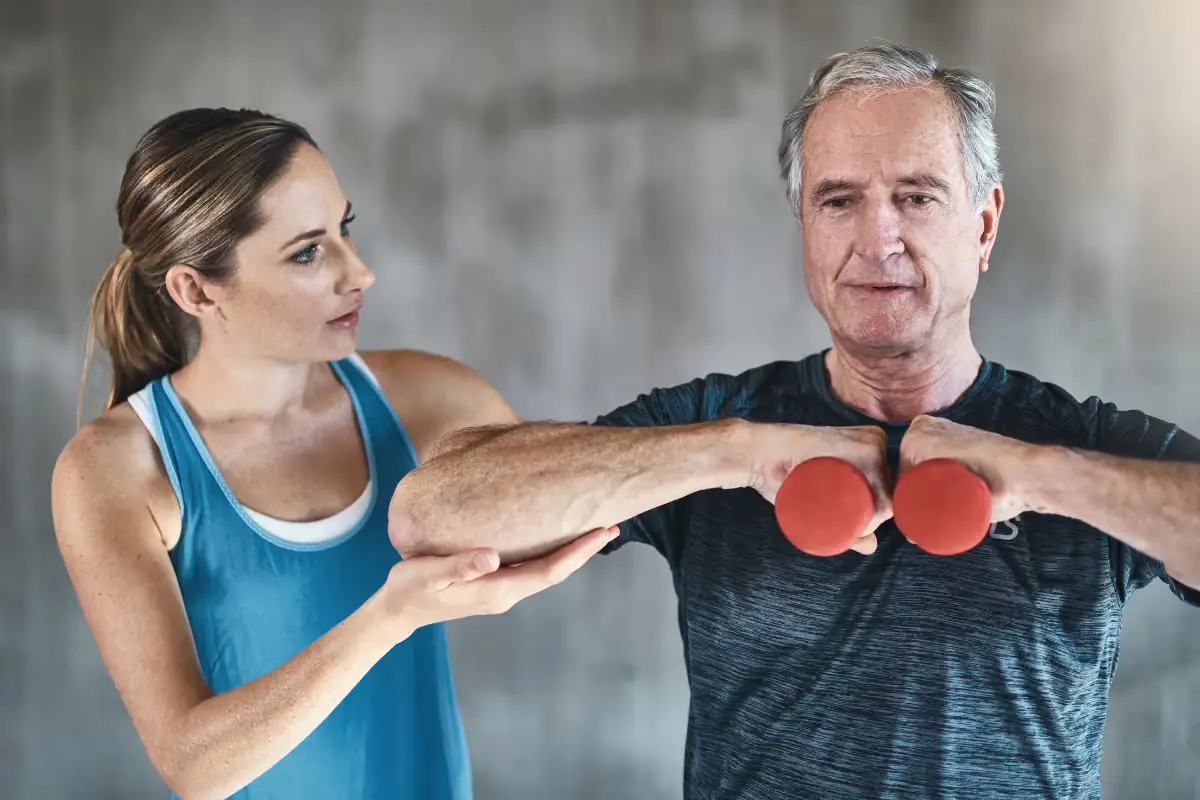It may sound counterintuitive, but weight and strength training really can help reduce the pain of arthritis. In fact, a review of eight studies on adults with osteoarthritis found that following a strength training programme reduced the pain participants felt by 35%.
We’re not suggesting you try to lift 100KG weights – if you are experiencing bad arthritis pain you may want to take it easy for the day – but adding strength training to your exercise regime can be really beneficial.
How weight and strength training are good arthritis
We naturally lose muscle mass as we age, which can slow down our metabolism and contribute to weight gain. Having a high BMI (overweight or obese) can put extra pressure on the joints, which can make the pain of arthritis worse. Luckily, you can lessen the natural effects of ageing by working your muscles in weight and strength training.
Studies have shown that exercising with arthritis is crucial. It helps strengthen the muscles around the joint and by keeping joints moving we get essential nutrients circulating to the joint. Keeping active has even been proven to help reduce the pain of arthritis and improve function. When you first start exercising with arthritis it’s usual to feel a little pain, but listen to your body and only do what you can manage.
If you’re in any doubt as to what you can and cannot do consult with your healthcare professional who will be able to give you clear personalised advice.
Exercise is key to managing arthritis
You might think that strength training would put too much pressure on your joints and could make arthritis worse. We do recommend speaking to your doctor before undertaking a new exercise regime, but strength training can be undertaken by people who have arthritis.
Osteoarthritis is not caused by too much exercise, and exercise does not damage the joints. People who have had sporting injuries are more likely to develop osteoarthritis in that joint, but even extreme sportsmen and women are not usually more prone to osteoarthritis. So anything that gets you moving is good.
You also don’t need to assume that strength training should involve equpiment. Exercises such as using your own body weight to strengthen muscles can be a great form of exercise to help strengthen muscles around painful joints.
Things to look out for with weight and strength training
It’s really important to incorporate a warm up and a cool down into your exercise regime to help elongate the muscles. You can do this by doing a few yoga sequences or taking the time to stretch before and after your workout.
This is especially true if you have gone for a long period of time without exercising. This might be due to pain management, illness or the arthritis you’re now looking to manage but it’s key to take things slow to begin with. It is always recommended to get some advice when doing strengthening or mobility exercises. This can help you set goals with the help of a professional.
Start slow and remember, it’s normal for muscles that have not been used in a particular way before to feel a little sore and uncomfortable when they are called into action again. They key it to allow them time to get used to this new movement but also to allow them to recover between sessions. It’s easy to get over excited and over do it.
It’s really important to incorporate a warm up and a cool down into your exercise regime to help elongate the muscles. You can do this by doing a few yoga sequences or taking the time to stretch before and after your workout.
Pain doesn’t mean gain
While it is normal for your muscles to ache after a workout session, especially if you’ve used muscles that haven’t seen much action for a while, your workout itself should not be painful. It should be challenging, but you should not be experiencing any sharp pains or anything that feels wrong. If this happens, stop your work out and consult a doctor if the pain persists.
This might happen if the weight is too high or if your form and movements are incorrect. It’s really helpful to watch some exercise videos of the movements you will be doing to see what the correct form is and, if possible, workout in front of a mirror so you can see what your body is doing.
Find the right equipment for you
Home gyms are all well and good, but most of us can’t afford them or fit them into our homes. Luckily, there are a lot of ways to do strength training – and a lot of equipment options.
Anything that creates tension and load across muscles has the potential to stimulate strength gains in that muscle. Weights and gym equipment are one way to achieve this, but they’re not the only way.
Dumbbells (2-3 pounds for women and 5-8 pounds for men if you’re just starting out) are a great and fairly affordable piece of equipment which you can use at home, but you can also get fit using your own body weight.
Results can be gained by using your own body or simple exercise bands to improve your strength. Simple exercises with variations in the speed at which you do them can be incredibly beneficial to strength. Such activity is a great starting point if you are unfamiliar with weights, or if you’ve had a long period of inactivity.
There are a lot of benefits to weight and strength training if you have arthritis, just as long as you warm up, cool down, listen to your body and take things slow. What are some of your favourite strength training exercises? Let us know!




